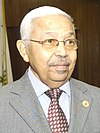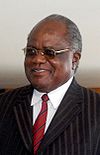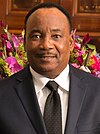Ibrahim Prize
This article may have been created or edited in return for undisclosed payments, a violation of Wikipedia's terms of use. It may require cleanup to comply with Wikipedia's content policies, particularly neutral point of view. (January 2024) |
| The Ibrahim Prize | |
|---|---|
| Awarded for | Excellence in African leadership |
| Sponsored by | Mo Ibrahim Foundation |
| Presented by | Independent Prize Committee |
| Reward(s) | $5 million |
| Established | 2007 |
| Last awarded | 2020 |
| Website | moibrahimfoundation.org |
The Ibrahim Prize for Achievement in African Leadership, also known as the Ibrahim Prize, is an annual prize awarded to a former African Executive Head of State or Government on criteria of good governance, democratic election and respect of terms limits. Since its inception, the Prize has been awarded 7 times. It has often not been offered, with no leader being found worthy of the award on a given year.[1][2]
Background
[edit]Established by the Mo Ibrahim Foundation in 2007, the Ibrahim Prize celebrates excellence in African leadership. It is awarded to a former Executive Head of State or Government by an independent Prize Committee composed of eminent figures, including two Nobel Laureates. Prize winners are referred to as Ibrahim Laureates.[2]
The Ibrahim Prize
- Recognises and celebrates African leaders who have developed their countries, lifted people out of poverty and paved the way for sustainable and equitable prosperity
- Highlights exceptional role models for the continent
- Ensures that Africa continues to benefit from the experience and expertise of exceptional leaders when they leave national office, by enabling them to continue in other public roles on the continent
Criteria
- Former African head of government
- Left office in the last three years
- Democratically elected
- Served their constitutionally mandated term
- Demonstrated exceptional leadership
Award
[edit]Prize recipients are awarded US$5 million, divided into annual instalments of US$500,000 paid out over 10 years, followed by US$200,000 annually, thereafter.[2]
With a US$5 million payment, the Ibrahim Prize, is believed to be the world's largest, exceeding the $1.5m Nobel Peace Prize.[3][4] Former South African President Nelson Mandela, former United States President Bill Clinton, and former United Nations Secretary-General Kofi Annan are among those who have welcomed the initiative.[5]
The Ibrahim Prize for Achievement in African Leadership has been awarded in 2007, 2008, 2011, 2014, 2017 and 2020. Former South African president Nelson Mandela was named an honorary laureate in 2007.[2] Desmond Tutu was awarded a Special Prize for speaking truth to power in 2012.[6]
Prize Committee
[edit]- Festus Mogae (Chair), former President of Botswana[7]
- Aicha Bah Diallo, former Education Minister of Guinea[3]
- Mohamed ElBaradei, Director General Emeritus, International Atomic Energy Agency[2]
- Horst Köhler, former President of Germany[8]
- Graça Machel, Former Education Minister of Mozambique[2]
- Mary Robinson, former President of Ireland[2]
Former Committee Chairs:
- Kofi Annan (2007-2011), former Secretary-General of the United Nations
- Salim Ahmed Salim (2007-2020), former Prime Minister of Tanzania and Secretary General of the Organisation of African Unity
Former Committee members:
- Ngozi Okonjo-Iweala (2007-2008), Director-General of the World Trade Organization and former Finance Minister of Nigeria[3]
- Martti Ahtisaari (2007-2019), former President of Finland[9]
Laureates
[edit]| Year | Laureate[10] | Country | Rationale | |
|---|---|---|---|---|
| 2007 | 
|
Joaquim Chissano | "President Chissano’s achievements in bringing peace, reconciliation, stable democracy and economic progress to his country greatly impressed the committee."[11][12] | |

|
Nelson Mandela (honorary)[13] | “Nelson Mandela stands as an inspiration, in South Africa and throughout the world, to all who share his devotion to democracy and equality. In presenting this Laureate, the Foundation would like to celebrate his extraordinary achievements and support the important work of the foundations he established.”[14] | ||
| 2008 | 
|
Festus Mogae[15] | "President Mogae's outstanding leadership has ensured Botswana’s continued stability and prosperity in the face of an HIV/AIDS pandemic which threatened the future of his country and people."[16] | |
| 2009 | No award given[17] | |||
| 2010 | No award given[18] | |||
| 2011 | 
|
Pedro Pires[19] | “The prize committee ha[d] been greatly impressed by President Pedro Pires’s vision in transforming Cape Verde into a model of democracy, stability, and increased prosperity.” and, “President Pires embodies the type of leadership the prize is designed to recognise.”[20] | |
| 2012 | No award given[21] | |||
| 2013 | No award given[22] | |||
| 2014 | 
|
Hifikepunye Pohamba[23] | “President Pohamba’s focus on forging national cohesion and reconciliation at a key stage of Namibia’s consolidation of democracy and social and economic development impressed the committee” and, “During the decade of Hifikepunye Pohamba’s Presidency, Namibia’s reputation has been cemented as a well-governed, stable and inclusive democracy with strong media freedom and respect for human rights.”[24] | |
| 2015 | No award given[25] | |||
| 2016 | No award given[26] | |||
| 2017 | 
|
Ellen Johnson Sirleaf[27] | “Ellen Johnson Sirleaf took the helm of Liberia when it was completely destroyed by civil war and led a process of reconciliation that focused on building a nation and its democratic institutions. In very difficult circumstances, she helped guide her nation towards a peaceful and democratic future, paving the way for her successor to follow.”[28] | |
| 2018 | No award given[1] | |||
| 2019 | No award given[29] | |||
| 2020 | 
|
Mahamadou Issoufou[30] | "For his efforts to economic development of his country while working for regional stability, as well as his engagement to limit himself to two terms, leading to the first ever democratic transition of power in Niger. In the face of the most severe political and economic issues, President Issoufou has led his people on a path of progress."[31] | |
| 2021 | No award given | |||
| 2022 | No award given | |||
See also
[edit]References
[edit]- ^ a b Flanagan, Jane (2019-08-06). "African leaders fail $5m test yet again". The Times. ISSN 0140-0460. Retrieved 2019-08-15.
- ^ a b c d e f g "Mo Ibrahim: 'It is the head of the fish that goes rotten first'". Financial Times. 2017-11-15. Retrieved 2023-02-22.
- ^ a b c "Prize may improve African leadership - Annan". Retrieved 2023-02-22.
- ^ "Africa: Former President of Mozambique Wins Leadership Prize". allAfrica.com. 2007-10-22. Retrieved 2023-02-22.
- ^ "Prize offered to Africa's leaders". BBC. 26 October 2006. Retrieved 2008-10-21.
- ^ Yeung, Todd Leopold,Larry Madowo,Jessie (2021-12-26). "Desmond Tutu, anti-apartheid leader and voice of justice, dead at 90". CNN. Retrieved 2023-02-22.
{{cite web}}: CS1 maint: multiple names: authors list (link) - ^ "Niger president Issoufou wins $5m leadership prize". Financial Times. 2021-03-08. Retrieved 2023-02-22.
- ^ "Prize Committee". Mo Ibrahim Foundation. Retrieved 2023-02-22.
- ^ "About". CMI. Retrieved 2023-02-22.
- ^ "Mo Ibrahim Foundation - Laureates". Mo Ibrahim Foundation. Retrieved 21 November 2015.
- ^ "Mozambique ex-leader wins prize". BBC News. 22 October 2007. Retrieved 2008-10-21.
- ^ "Africa: Former President of Mozambique Wins Leadership Prize". allAfrica.com. 2007-10-22. Retrieved 2023-02-22.
- ^ Tutton, Mark (14 October 2013). "Mo Ibrahim prize for African leaders: No winner ... again". CNN. Retrieved 28 July 2015.
- ^ "Nelson Mandela named Honorary Laureate by Mo Ibrahim Foundation". Modern Ghana. Retrieved 2023-02-22.
- ^ "Festus Mogae wins Ibrahim Prize". BBC News. 20 October 2008. Retrieved 2008-10-21.
- ^ "Botswana's Mogae wins African leadership prize". Reuters. 2008-10-20. Retrieved 2023-02-22.
- ^ "No award". 19 October 2009. Archived from the original on 27 October 2009. Retrieved 2009-10-19.
- ^ "No award". 19 October 2009. Archived from the original on 27 October 2009. Retrieved 2009-10-19.
- ^ "Cape Verde ex-leader Pedro Pires wins Mo Ibrahim prize". BBC News. 10 October 2011. Retrieved 2011-10-10.
- ^ Tran, Mark (2011-10-10). "Cape Verde's Pedro Pires wins Mo Ibrahim African leadership prize". The Guardian. ISSN 0261-3077. Retrieved 2023-02-22.
- ^ McGregor, Sarah (15 October 2012). "Mo Ibrahim Foundation Picks No Winner for African Leader Award". Bloomberg News.
- ^ "Mo Ibrahim African leaders prize unclaimed again". BBC News. 14 October 2013. Retrieved 2013-10-14.
- ^ "Announcement". Mo Ibrahim Foundation. 2 March 2015. Retrieved 2 March 2015.
- ^ Anderson, Mark (2015-03-02). "Namibia's president wins $5m African leadership prize". The Guardian. ISSN 0261-3077. Retrieved 2023-02-22.
- ^ "Mo Ibrahim Foundation announces no winner of 2015 Ibrahim Prize for Achievement". 20 June 2016. Retrieved 2016-12-02.[permanent dead link]
- ^ "Mo Ibrahim Foundation announces no winner of 2016 Ibrahim Prize for Achievement". 28 February 2017.
- ^ "Announcement". Mo Ibrahim Foundation. 12 February 2018. Retrieved 12 February 2018.
- ^ "Ex-Liberian president wins prize for African leadership". www.aljazeera.com. Retrieved 2023-02-22.
- ^ "Ex-Botswana leader appointed chair of Ibrahim Prize committee". apanews.net. Retrieved 26 February 2020.
- ^ https://www.rfi.fr/fr/afrique/20210307-le-prix-mo-ibrahim-attribu%C3%A9-au-pr%C3%A9sident-nig%C3%A9rien-mahamadou-issoufou Le prix Mo Ibrahim attribué au président nigérien Mahamadou Issoufou
- ^ "Niger's outgoing president wins $5m African leadership prize". www.aljazeera.com. Retrieved 2023-02-22.
External links
[edit]- Official website
- The Dictator Index by Ken Auletta
- Mike Jakeman, "Rewarding the Rich"[usurped], The Oxonian Review
